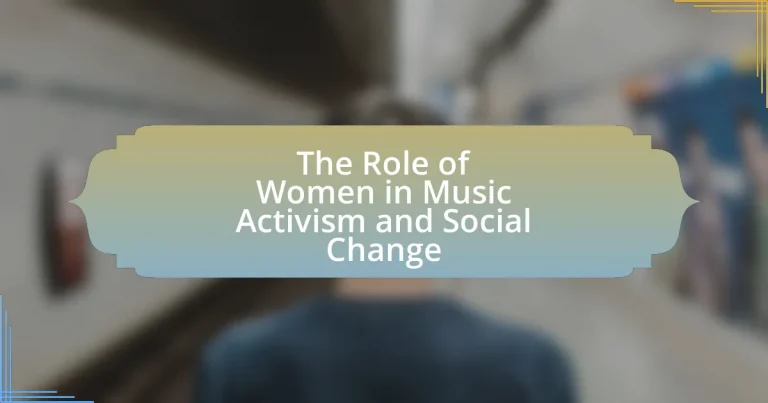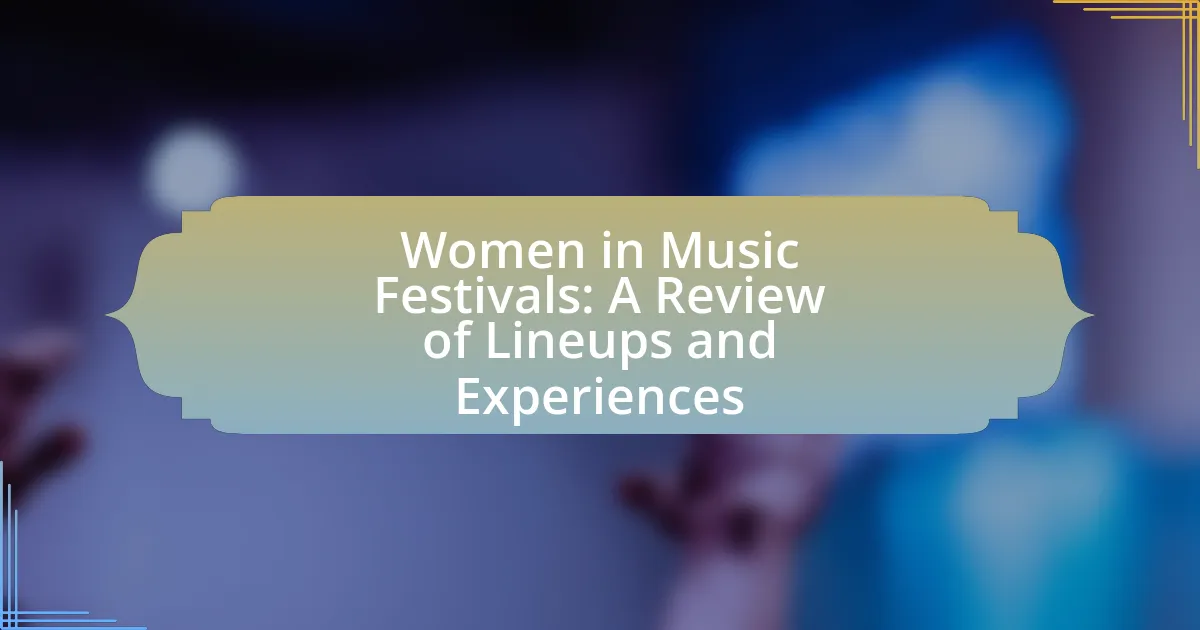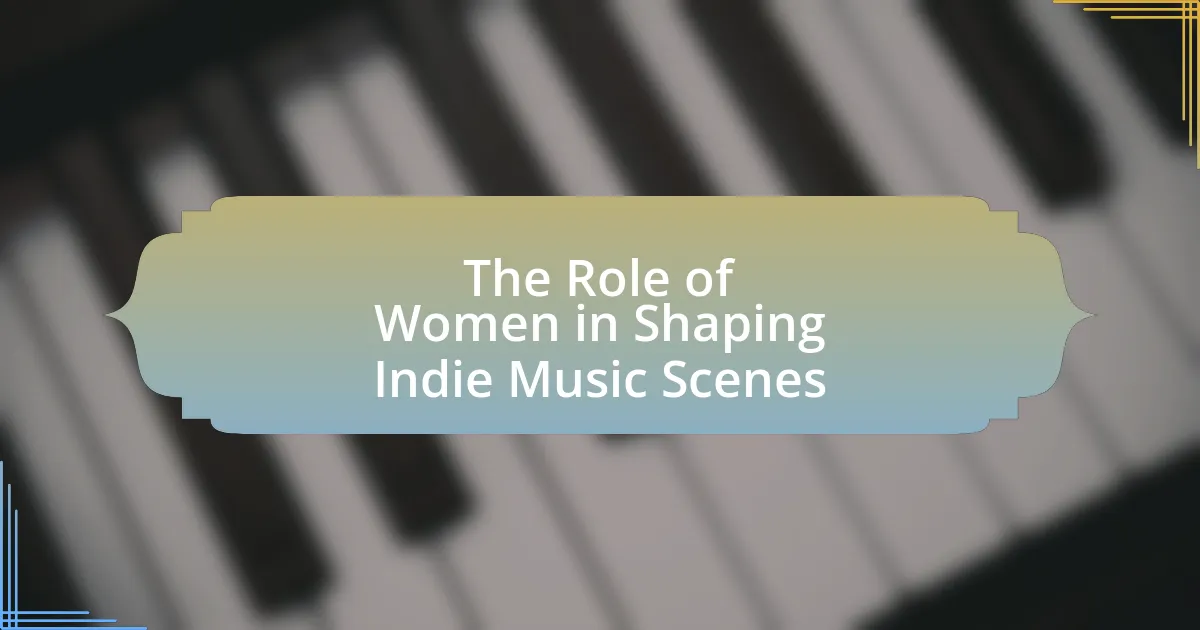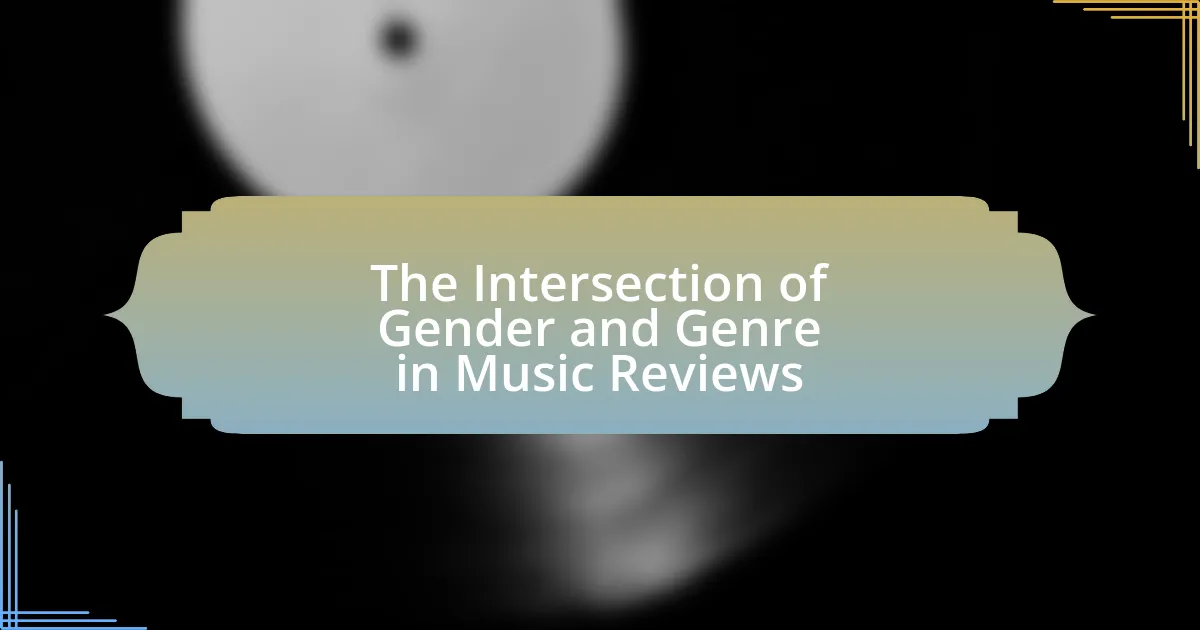The article examines the significant role of women in music activism and social change, highlighting their historical and contemporary contributions to various social movements. It discusses how female musicians, from Billie Holiday to Beyoncé, have utilized their platforms to advocate for issues such as civil rights, gender equality, and LGBTQ+ rights. The article also addresses the challenges women face in the music industry, including gender discrimination and underrepresentation, while emphasizing the psychological impact of music on social movements and the importance of collaboration among female artists. Additionally, it outlines practical steps aspiring female musicians can take to engage in activism through their art.

What is the Role of Women in Music Activism and Social Change?
Women play a crucial role in music activism and social change by using their artistic platforms to address social issues, advocate for equality, and inspire movements. Historically, female musicians like Billie Holiday and Joan Baez have utilized their music to highlight civil rights and social justice, influencing public opinion and mobilizing communities. In contemporary contexts, artists such as Beyoncé and Taylor Swift have addressed issues like gender inequality and LGBTQ+ rights through their lyrics and public statements, demonstrating the power of music as a tool for activism. Research indicates that music can significantly impact social movements, with women often at the forefront, shaping narratives and fostering solidarity among diverse groups.
How have women historically contributed to music activism?
Women have historically contributed to music activism by using their artistic platforms to advocate for social change and raise awareness about various issues. For instance, artists like Billie Holiday highlighted racial injustice through songs such as “Strange Fruit,” which addressed the lynching of African Americans in the early 20th century. Additionally, folk singer Joan Baez played a significant role in the civil rights movement and anti-war protests during the 1960s, using her music to mobilize support and inspire activism. Furthermore, contemporary artists like Beyoncé and Lady Gaga continue this legacy by addressing issues such as gender equality and LGBTQ+ rights in their music and public appearances, demonstrating the ongoing impact of women in music activism throughout history.
What key movements have been influenced by female musicians?
Female musicians have significantly influenced key movements such as feminism, civil rights, and LGBTQ+ rights. For instance, artists like Joan Baez and Nina Simone used their music to advocate for civil rights during the 1960s, with Simone’s “Mississippi Goddam” directly addressing racial injustice. Additionally, the Riot Grrrl movement of the 1990s, led by bands like Bikini Kill, combined punk music with feminist activism, challenging gender norms and promoting women’s rights. Furthermore, musicians like Madonna and Lady Gaga have played pivotal roles in LGBTQ+ advocacy, using their platforms to promote acceptance and equality. These examples illustrate how female musicians have been at the forefront of social change through their artistic expression and activism.
How did early female artists pave the way for future activism?
Early female artists paved the way for future activism by using their music and art as platforms to address social issues and advocate for change. For instance, artists like Billie Holiday and Joan Baez highlighted racial injustice and anti-war sentiments through their songs, influencing public opinion and inspiring future generations of activists. Their work not only challenged societal norms but also established a precedent for artists to engage in political discourse, demonstrating the power of music as a tool for social change. This legacy continues to empower contemporary female artists to address issues such as gender equality and environmental justice, reinforcing the vital role of women in activism through artistic expression.
Why is music an effective tool for social change?
Music is an effective tool for social change because it has the power to unite people, convey messages, and inspire action. Historically, songs like “We Shall Overcome” during the Civil Rights Movement galvanized communities and communicated the struggle for equality. Research shows that music can evoke strong emotional responses, making it easier for individuals to connect with social issues. For instance, studies indicate that music can increase empathy and motivate listeners to engage in activism, as seen in campaigns like Live Aid, which raised awareness and funds for famine relief in Ethiopia.
What psychological impacts does music have on social movements?
Music significantly influences the psychological dynamics of social movements by fostering collective identity, emotional expression, and motivation among participants. It serves as a tool for unifying individuals around shared values and goals, enhancing group cohesion. For instance, during the Civil Rights Movement in the United States, songs like “We Shall Overcome” not only provided a sense of hope but also reinforced a collective identity among activists, facilitating emotional resilience. Research indicates that music can evoke strong emotional responses, which can lead to increased engagement and commitment to social causes, as seen in studies examining the role of protest songs in mobilizing communities.
How does music foster community and solidarity among activists?
Music fosters community and solidarity among activists by serving as a unifying force that amplifies shared messages and emotions. Through collective singing, rhythmic chanting, and the use of anthems, music creates a sense of belonging and shared purpose among individuals engaged in social movements. For instance, during the Civil Rights Movement, songs like “We Shall Overcome” became rallying cries that not only inspired participants but also connected diverse groups under a common goal of justice and equality. This phenomenon is supported by research indicating that music can enhance group cohesion and collective identity, making it a powerful tool for mobilizing and sustaining activism.
What challenges do women face in music activism?
Women face significant challenges in music activism, including gender discrimination, lack of representation, and societal stereotypes. Gender discrimination manifests in unequal opportunities for women artists and activists, often limiting their access to platforms and funding. Research indicates that women are underrepresented in music festivals and industry leadership roles, with only 23% of artists at major festivals being female, according to a 2020 report by the Annenberg Inclusion Initiative. Additionally, societal stereotypes often portray women in music as less credible or authoritative, which can undermine their activism efforts. These challenges collectively hinder women’s ability to influence social change through music effectively.
How do societal norms affect women’s participation in music activism?
Societal norms significantly restrict women’s participation in music activism by perpetuating stereotypes that limit their roles and influence. These norms often dictate that women should conform to traditional expectations of femininity, which can discourage them from taking on leadership roles or expressing dissent through music. For instance, research by the Women’s Media Center indicates that women are underrepresented in music genres associated with activism, such as punk and hip-hop, where male dominance is prevalent. Additionally, societal expectations can lead to a lack of support for women artists, making it challenging for them to gain visibility and recognition in activist movements. This systemic bias ultimately hinders the effectiveness and diversity of music activism, as women’s voices and perspectives are marginalized.
What barriers exist for women in the music industry related to activism?
Barriers for women in the music industry related to activism include systemic sexism, lack of representation, and limited access to resources. Systemic sexism manifests in unequal opportunities for women artists to engage in activism, often sidelining their voices in favor of male counterparts. Additionally, women are underrepresented in key decision-making roles within the industry, which diminishes their influence on social change initiatives. Limited access to funding and platforms further restricts women’s ability to promote their activist messages effectively. According to a 2020 report by the Annenberg Inclusion Initiative, women accounted for only 21.6% of artists in popular music, highlighting the significant disparity that affects their activism efforts.
How can women leverage music for social change today?
Women can leverage music for social change today by using their platforms to raise awareness about social issues, advocate for marginalized communities, and inspire collective action. For instance, artists like Billie Eilish and Beyoncé have addressed topics such as mental health, racial injustice, and gender equality through their lyrics and public statements, effectively mobilizing their fan bases. Research shows that music can influence public opinion and behavior; a study published in the Journal of Music and Social Change highlights how songs with social messages can lead to increased activism among listeners. By creating and promoting music that reflects social concerns, women can drive conversations and foster movements that challenge the status quo.
What are some successful examples of women-led music activism?
Successful examples of women-led music activism include the work of artists like Billie Eilish, who has used her platform to advocate for mental health awareness and climate change, and the #MeToo movement, which was significantly amplified by musicians such as Kesha and Lady Gaga. Billie Eilish’s song “All the Good Girls Go to Hell” addresses climate issues, while Kesha’s legal battles against her former producer highlighted sexual assault in the music industry. Additionally, the Women’s March on Washington in 2017 featured performances by women artists like Janelle Monáe, who used their music to promote social justice and equality. These instances demonstrate how women in music have effectively mobilized their influence to drive social change and raise awareness on critical issues.
How have contemporary female artists addressed social issues through their music?
Contemporary female artists have addressed social issues through their music by using their platforms to raise awareness and advocate for change. For instance, artists like Billie Eilish and Halsey have tackled topics such as mental health, body image, and sexual assault in their lyrics and public statements. Eilish’s song “Your Power” discusses the dynamics of power and abuse, while Halsey’s “Nightmare” confronts the struggles women face in a patriarchal society. Additionally, artists like Lizzo promote body positivity and self-acceptance, challenging societal beauty standards. These artists not only express their personal experiences but also resonate with broader social movements, such as #MeToo and Black Lives Matter, thereby amplifying critical conversations through their music.
What role do collaborations play in enhancing the impact of women in music activism?
Collaborations significantly enhance the impact of women in music activism by amplifying their voices and expanding their reach. When women artists collaborate, they combine diverse talents and perspectives, which fosters a richer dialogue around social issues. For instance, collaborations like the “Women’s March on Washington” concert in 2017 showcased various female artists uniting for a common cause, thereby increasing visibility and support for women’s rights. This collective effort not only strengthens individual messages but also creates a powerful platform for advocacy, as seen in initiatives like the “Sisterhood of Hip Hop,” where female rappers collaborate to address gender inequality in the music industry. Such partnerships lead to greater audience engagement and can drive social change more effectively than solo efforts.
What practical steps can aspiring female musicians take to engage in activism?
Aspiring female musicians can engage in activism by using their platforms to raise awareness about social issues, such as gender equality and mental health. They can organize benefit concerts or participate in music festivals that support charitable causes, thereby directly contributing to social change. Additionally, they can collaborate with organizations focused on women’s rights, leveraging their music to amplify these messages. Research indicates that musicians who actively engage in social issues can influence public opinion and inspire action, as seen in campaigns led by artists like Billie Eilish and Taylor Swift, who have used their visibility to advocate for various causes.





